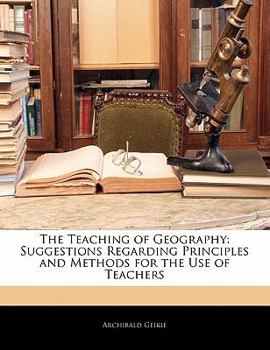The Teaching of Geography: Suggestions Regarding Principles and Methods for the Use of Teachers
Select Format
Select Condition 
Book Overview
"The Teaching of Geography" by Archibald Geikie, originally published in 1887, offers a detailed exploration of the principles and methods involved in geography education. This volume provides invaluable suggestions for teachers seeking to enhance their pedagogical approaches. Geikie emphasizes the importance of engaging students through practical exercises and real-world examples, advocating for a curriculum that connects geographical concepts to students' everyday lives.
The book covers a range of topics, including map reading, physical geography, and the study of different regions and cultures. Geikie's work remains relevant for educators interested in the historical development of geography teaching and for those looking to incorporate time-tested strategies into their modern classrooms. This edition preserves the original text, allowing readers to experience Geikie's insights firsthand and appreciate the enduring value of his contributions to the field of education.
This work has been selected by scholars as being culturally important, and is part of the knowledge base of civilization as we know it. This work was reproduced from the original artifact, and remains as true to the original work as possible. Therefore, you will see the original copyright references, library stamps (as most of these works have been housed in our most important libraries around the world), and other notations in the work.
This work is in the public domain in the United States of America, and possibly other nations. Within the United States, you may freely copy and distribute this work, as no entity (individual or corporate) has a copyright on the body of the work.
As a reproduction of a historical artifact, this work may contain missing or blurred pages, poor pictures, errant marks, etc. Scholars believe, and we concur, that this work is important enough to be preserved, reproduced, and made generally available to the public. We appreciate your support of the preservation process, and thank you for being an important part of keeping this knowledge alive and relevant.





